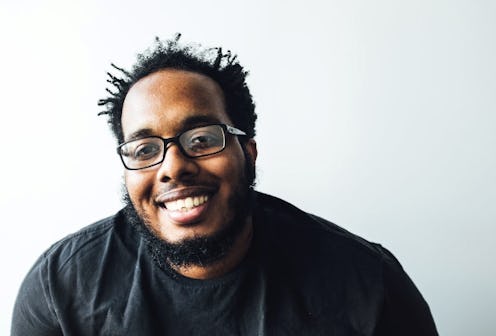Life
This Photo Project Dismantles Harmful Stereotypes

As many will attest, a nuanced narrative of black men simply doesn't exist in the media these days. But the We Love You Project, spearheaded by photographer Bryon Summers, is seeking to reverse the dangerously negative archetypes of black masculinity that so many of us have become desensitized to by linking up with Google Arts & Culture for a digital exhibit that will be wide-reaching indeed. What was already an innovative project when it debuted during the summer of 2016 has been given a signal boost just in time for Black History Month. And it's hopefully going to help re-address the dominant depictions of black men and dismantle those damaging and harmful stereotypes.
Starting at a young age, our cultural narrative often strips black men of their humanity. They are marked as "strong" and "scary," when in fact they are unarmed children. They are labelled as "big bad dudes" to justify people fatally shooting them — again, when they are unarmed. They are often criminalized without cause. This is the effect of what philosopher George Yancy called the "white gaze," an endemic, structural way of justifying the mistreatment and oppression of black men which has its origins in slavery. As Remi Joseph Salisbury recently noted in the Independent, "Looking through the white gaze ... white people generally, and white police officers specifically, do not see black people. What they see instead is a figment of their imagination: an imagination that has been collectively constructed for centuries. In the place of black humanity, they see The Black monster."
All of this and more is why we need things like the We Love You Project right now.
The We Love You Project was originally launched by photographer Bryon Summers on July 27, 2016. In addition to an official We Love You Project website, the photos also gained traction on Instagram. According to BET, the project had 165 images and participants in August 2016 — and as of now, there are over 500 portraits in the series featuring black men of all ages from all over the United States.
For Black History Month, Google invited Summers to photograph Google's black male staffers. The images are featured on on Google Arts & Culture, an online network of global photography and art works; additionally, Google has launched a digital gallery of more than 300 portraits from the We Love You Project, as well. On the gallery page, the works are described as, "as much as art project as it is a form of protest. ... The project is a simple but powerful reassurance to our black boys and men that even though it feels like we are being murdered and destroyed constantly, we are still a part of a larger community that loves and supports us."
Summers stated in a press release that he believes the scope of the project has helped to shape and reflect the diversity of the experience of black men in America and beyond. Furthermore, he noted the importance of the collaboration with Google: "Google also invited us to photograph Black Googlers at its Mountain View headquarters — another huge turning point for the project. Not only is Google helping us reach our goal of 1,000 portraits — the company's participation reflects its commitment to diversity and to being an ally of the Black community."
As Summers explains in a video about the series, "As an individual, I don't feel like marching or protesting. ... Marching is cool; it brings awareness, and that's great. But as a photographer, I felt like, that's my voice. My voice is louder through images." It's a testament to the power of art; it gives voice to issues we might otherwise not know how to articulate.
With the continued demonization of black men in the media and our society at large, projects like this are helping create a positive space for black people both to express themselves and see themselves represented accurately. And when a giant company like Google supports art like this, it offers an exciting platform to reach even more people. Let's hope there will be more projects like this one — projects that tackle stereotypes and stigma in many different marginalized groups — in the future.
Because it's clear how much we need them.